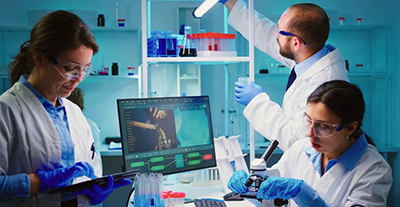
In this article, Henal Shah, Head of Life Sciences Lab Practice Europe & M&A, and John Dunne, Lab Centre of Excellence Consultant at Cognizant, Life Sciences Manufacturing, explore the driving forces behind the “digital lab” concept and its potential to transform the pharmaceutical industry. Shah and Dunne also provide a strategic guide for organizations seeking to adopt a roadmap toward the digital lab.

Recent industry pressures brought on by the global COVID-19 pandemic provided critical lessons for the life sciences industry, and labs in particular, highlighting the urgent need for accelerated speed in bringing new medicines, vaccines and diagnostic testing services to market.
Before the pandemic hit, segments of the life sciences space, such as biopharma manufacturers, were slower to adopt new data management technology. Often working across legacy systems, companies needed to carefully orchestrate the acquisition, storage and analysis of their lab data across disparate sources to extract its full value — often a near-impossible task to complete in its entirety.
Now, in a post-COVID-19 world, the need for digital change remains stronger than ever. Accelerated vaccine release has changed patient expectations regarding cycle times for bringing medicines to the market. It has become evident to many across the industry that the research, development and manufacturing life cycle must become more agile and flexible. At the same time, the process must remain compliant with the strict regulatory requirements that come with accelerated product launches.
Today, the “lab of the future” or “digital lab” is seen as a business imperative. Based on key digital transformation concepts defined in Industry 4.0, the digital lab goes far beyond simply going digital. Instead, it is about creating an interconnected lab ecosystem that harnesses the latest technological advancements, coupled with sustainability, user adaptability and business intelligence.
For many, creating an end-to-end digital lab has only ever been a pipe dream. Its successful implementation, however, has never been more important in meeting evolving industry challenges head-on. There is a feeling that lab technology is now ready to meet the needs of the pharmaceutical industry and transform lab processes, and the industry is ready to commit to that technology.
Striking the right balance between implementing digital solutions and choosing the right personnel and processes is key to realizing the potential of the digital lab, and failure to act now could cost companies dearly. Life science companies that are behind the digital curve are experiencing associated costs that reached a staggering $650 million in 2018, compared to $103 million in 2015. These costs have only increased since the pandemic. Imminent strategic adoption of digital lab innovations is key to gaining a competitive market advantage.
Creating a digital lab can address emerging needs and help clients overcome traditional obstacles, enabling greater efficiency, cost savings and better regulatory compliance. Benefits are also seen in information transparency, data integrity and talent retention.
A digital lab is an interconnected, digitized lab ecosystem integrated with manufacturing shop floor and enterprise systems that harnesses the latest technological advancements, coupled with sustainability, user adaptability and built-in cyber security. It creates platform-based lab environments with interoperable systems and utilizes artificial intelligence (AI), machine learning (ML), augmented reality (AR), virtual reality (VR), 3D modeling and advanced analytics to simplify data access for visualization, create predictable behavior in a lab and improve business processes.
There are multiple advantages derived from digital lab strategies, including:
● Accelerated product launches driven by faster access to data through interconnected applications.
● Empowered laboratory staff working more seamlessly across research and manufacturing activities and functional domains.
● Better performance and analysis of large-scale parallel experiments via automation-enabled lab management systems.
● Process improvements through digital labs that can help streamline operations and processes.
● Cloud adoption and automation that can deliver a more robust lab ecosystem.
Through these enhanced processes, the digital lab can have an additional business impact and deliver a competitive advantage by:
● Accelerating commercial product launches with quality by design.
● Reducing drug development and approval cycles.
● Improving manufacturing efficiencies.
● Enhancing regulatory compliance and audit-ready labs.
● Strengthening connectivity and seamless digital business process flow.
● Delivering a single source of data truth for data integrity and end-to-end traceability.
Although the digital lab offers significant promise to life science companies, the industry has historically been hesitant to pull the trigger on such investments. This largely comes down to concerns around cloud security, data integrity, regulatory compliance, perceived difficulties in the transformation process, value to business and a shortage of skilled labor. But as more companies reap the benefits of the digital revolution and more startups emerge with a digital-first approach, this hesitancy is no longer commonplace. For companies ready to take the leap, there are a few considerations to bear in mind when embracing a digital transformation, such as:
To effectively move towards a truly digital lab, companies must first assess their current level of digital lab maturity. They should conduct an overview of their existing digital resources that can be incorporated into a digital lab roadmap, covering the following levels:
• Standardized and harmonized lab business processes, methodologies and technologies
• Lab informatics suites
• Integrated lab informatics platforms
• Digital lab — the digital lab of the future
It is important to note that for companies to achieve digital lab transformation, these maturity steps do not require completion in a linear order. For example, companies in the initial stage can transition from paper-based lab notebooks to cloud-based electronic lab notebooks (ELN) and avoid the costs associated with servers and maintenance. As long as the lab foundation is paperless, sequential progression is not mandatory.
During the initial planning stages, it is important to develop an action plan for integrating new or replacing any existing equipment in the lab. Some equipment may already possess digital capabilities but may require reconfiguration to enable cloud access and control. Assessment of digital abilities and cloud access control can help determine how much reconfiguration is required.

Embracing cloud technology reduces capital expenditure for laboratories and enables the distribution of operational costs over time. The selection of the appropriate cloud deployment mode depends on factors such as the company’s data security requirements, cost considerations and the availability of in-house infrastructure or regional cloud services.
For a straightforward transition to the digital lab, establishing a solid foundation through the development of a comprehensive digital strategy for the entire organization is crucial. This requires an understanding of the data already held and of its purpose, as well as the identification of key areas where technology — combined with data — can optimize overall business performance.
Leveraging advanced technology in this way can complement the skills of your workforce, freeing them to focus on critical decision-making while reducing manual steps in workflows to ensure end-to-end data integrity. Use of the latest digital technologies can also allow you to analyze work patterns and resource usage to gain further insights that can lead to waste reduction and increased efficiency in lab processes, minimizing your carbon footprint.
In addition, it is important to clearly communicate the impact of any incoming changes to your team. Giving the personnel a chance to voice their concerns and providing them with required training in any new protocols will leave them better equipped to adapt and feel actively involved in the transformation process.
With a solid foundation in place, organizations adopting the digital lab concept into their facilities are poised to revolutionize their lab processes, enhance productivity and drive more sustainable practices, making it clear that this is no longer just a pipe dream.
By actively embracing change management and empowering their workforce with cutting-edge technologies, companies can ensure a seamless transition to the digital lab. By bringing together robotics, AI/ML, AR/VR and informatics, working in collaboration with human talent, life science companies can unlock greater levels of efficiency and enhance their business decision-making capabilities.
The future of life science pioneers who embrace digital transformation looks bright. By embracing change, these companies will have the tools and processes in place to gain a competitive advantage and drive further innovation that ultimately helps improve the quality of patient outcomes.